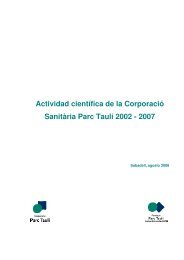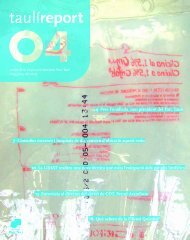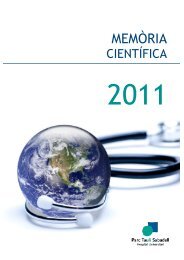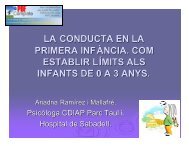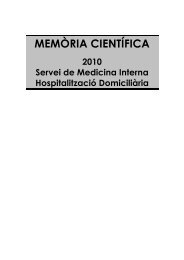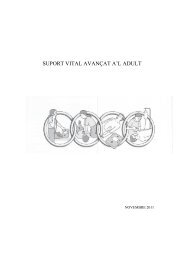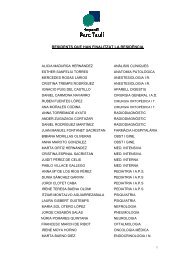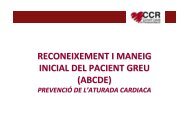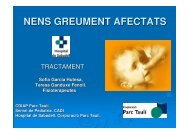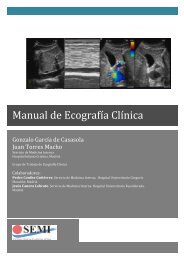- Page 1 and 2:
Manual de Urgencias de Pediatría H
- Page 3 and 4:
Cualquier forma de reproducción, d
- Page 5 and 6:
Llorente de la Fuente, Ana López D
- Page 7 and 8:
Las enfermedades que requieren “C
- Page 9 and 10:
consultas infantiles. Queremos agra
- Page 11 and 12:
Con la publicación de este libro,
- Page 13 and 14:
2.11 Síncope . . . . . . . . . . .
- Page 15 and 16:
8.7 Pancreatitis aguda . . . . . .
- Page 17 and 18:
12. Nefrología 12.1 Infección uri
- Page 20 and 21:
1.1 Reanimación cardiopulmonar G.
- Page 22 and 23:
Reanimación cardiopulmonar 3 Cuand
- Page 24 and 25:
Reanimación cardiopulmonar 5 TABLA
- Page 26 and 27:
Reanimación cardiopulmonar 7 - Se
- Page 28 and 29:
Reanimación cardiopulmonar 9 Si, d
- Page 30 and 31:
Reanimación cardiopulmonar 11 BIBL
- Page 32 and 33:
Atención inicial al politraumatiza
- Page 34 and 35:
Atención inicial al politraumatiza
- Page 36 and 37:
Atención inicial al politraumatiza
- Page 38 and 39:
Shock 19 ETIOLOGÍA. TIPOS DE SHOCK
- Page 40 and 41:
Shock 21 • Antecedentes de cardio
- Page 42 and 43:
Shock 23 Shock anafiláctico • Ad
- Page 44 and 45:
Shock 25 O min Identificar y tratar
- Page 46 and 47:
Manejo de la vía aérea 27 TABLA I
- Page 48 and 49:
Manejo de la vía aérea 29 FIGURA
- Page 50 and 51:
Manejo de la vía aérea 31 TABLA I
- Page 52 and 53:
Manejo de la vía aérea 33 TABLA I
- Page 54 and 55:
Manejo de la vía aérea 35 Una vez
- Page 56 and 57:
1.5 Técnicas y procedimientos en u
- Page 58 and 59:
Técnicas y procedimientos en urgen
- Page 60 and 61:
Técnicas y procedimientos en urgen
- Page 62 and 63:
Técnicas y procedimientos en urgen
- Page 64 and 65:
Técnicas y procedimientos en urgen
- Page 66 and 67:
2.1 Adenopatías F. Gómez Sáez, M
- Page 68 and 69:
Adenopatías 49 TABLA I. Etiología
- Page 70 and 71:
Adenopatías 51 No etiología evide
- Page 72 and 73:
Alimentación del lactante sano 53
- Page 74 and 75:
Alimentación del lactante sano 55
- Page 76 and 77:
Alimentación del lactante sano 57
- Page 78 and 79:
Alimentación del lactante sano 59
- Page 80 and 81:
Alteraciones hidroelectrolíticas 6
- Page 82 and 83:
Alteraciones hidroelectrolíticas 6
- Page 84 and 85:
Alteraciones hidroelectrolíticas 6
- Page 86 and 87:
Alteraciones hidroelectrolíticas 6
- Page 88 and 89:
Alteraciones hidroelectrolíticas 6
- Page 90 and 91:
Alteraciones hidroelectrolíticas 7
- Page 92 and 93:
2.4 Alteraciones del equilibrio ác
- Page 94 and 95:
Alteraciones del equilibrio ácido-
- Page 96 and 97:
2.5 Deshidratación. Rehidratación
- Page 98 and 99:
Deshidratación. Rehidratación ora
- Page 100 and 101:
Deshidratación. Rehidratación ora
- Page 102 and 103:
2.6 Dolor torácico I. Amores Hern
- Page 104 and 105:
Dolor torácico 85 se agrava más p
- Page 106 and 107:
Dolor torácico 87 - ECG completo d
- Page 108 and 109:
Dolor torácico 89 Dolor torácico
- Page 110 and 111:
2.7 Episodio aparentemente letal A.
- Page 112 and 113:
Episodio aparentemente letal 93 •
- Page 114 and 115:
Episodio aparentemente letal 95 •
- Page 116 and 117:
Episodio aparentemente letal 97 TAB
- Page 118 and 119:
Episodio aparentemente letal 99 Cri
- Page 120 and 121:
Llanto inconsolable 101 • Neurol
- Page 122 and 123:
Llanto inconsolable 103 ce claramen
- Page 124 and 125:
Llanto inconsolable 105 Lactante co
- Page 126 and 127:
Maltrato infantil 107 • Maltrato
- Page 128 and 129:
Maltrato infantil 109 sobreprotecci
- Page 130 and 131:
Maltrato infantil 111 tomas, dilata
- Page 132 and 133:
Maltrato infantil 113 • Si se val
- Page 134 and 135:
Maltrato infantil 115 Intervención
- Page 136 and 137:
Púrpura 117 Púrpura No ¿Fiebre o
- Page 138 and 139:
Púrpura 119 historia reciente de i
- Page 140 and 141: Síncope 121 Síncope cardíaco •
- Page 142 and 143: Síncope 123 • Antecedentes famil
- Page 144 and 145: Síncope 125 Hipotensión ortostát
- Page 146 and 147: Síncope 127 EVALUACIÓN INICIAL Hi
- Page 148 and 149: Sueroterapia y rehidratación intra
- Page 150 and 151: Sueroterapia y rehidratación intra
- Page 152 and 153: Sueroterapia y rehidratación intra
- Page 154: Sueroterapia y rehidratación intra
- Page 157 and 158: 138 A. Jiménez Asín, L.I. Gonzál
- Page 159 and 160: 140 A. Jiménez Asín, L.I. Gonzál
- Page 161 and 162: 3.2 Heridas y quemaduras R. Morante
- Page 163 and 164: 144 R. Morante Valverde, M.D. Delga
- Page 165 and 166: 146 R. Morante Valverde, M.D. Delga
- Page 167 and 168: 148 R. Morante Valverde, M.D. Delga
- Page 169 and 170: 150 R. Morante Valverde, M.D. Delga
- Page 171 and 172: 3.3 Ingesta y aspiración de cuerpo
- Page 173 and 174: 154 R. Morante Valverde, M. López
- Page 175 and 176: 156 R. Morante Valverde, M. López
- Page 177 and 178: 158 R. Morante Valverde, M. López
- Page 179 and 180: 160 M. Betés Mendicute, D. García
- Page 181 and 182: 162 M. Betés Mendicute, D. García
- Page 183 and 184: 164 M. Betés Mendicute, D. García
- Page 185 and 186: 166 M. Betés Mendicute, D. García
- Page 187 and 188: 168 M. Betés Mendicute, D. García
- Page 189: 170 P. López Gómez, A. Palacios C
- Page 193 and 194: 174 P. López Gómez, A. Palacios C
- Page 195 and 196: 176 P. López Gómez, A. Palacios C
- Page 197 and 198: 178 P. López Gómez, A. Palacios C
- Page 199 and 200: 180 P. López Gómez, A. Palacios C
- Page 201 and 202: 182 P. López Gómez, A. Palacios C
- Page 203 and 204: 184 P. Areal Hidalgo, L.I. Gonzále
- Page 205 and 206: 186 P. Areal Hidalgo, L.I. Gonzále
- Page 207 and 208: 188 P. Areal Hidalgo, L.I. Gonzále
- Page 209 and 210: 190 P. Areal Hidalgo, L.I. Gonzále
- Page 211 and 212: 192 B. García, M.J. Muñoz, B. Pas
- Page 213 and 214: 194 B. García, M.J. Muñoz, B. Pas
- Page 215 and 216: 196 B. García, M.J. Muñoz, B. Pas
- Page 217 and 218: 198 B. García, M.J. Muñoz, B. Pas
- Page 219 and 220: 200 B. García, M.J. Muñoz, B. Pas
- Page 221 and 222: 3.8 Traumatismo dental A.I. Romance
- Page 223 and 224: 204 A.I. Romance García, A. Pérez
- Page 225 and 226: 206 A.I. Romance García, A. Pérez
- Page 227 and 228: 3.9 Traumatismo nasal A. Gutiérrez
- Page 229 and 230: 210 A. Gutiérrez Jiménez, O. Ord
- Page 231 and 232: 212 A. Gutiérrez Jiménez, O. Ord
- Page 233 and 234: 214 L. Albert de la Torre, A. Mendo
- Page 235 and 236: 216 L. Albert de la Torre, A. Mendo
- Page 237 and 238: 218 L. Albert de la Torre, A. Mendo
- Page 239 and 240: 220 L. Albert de la Torre, A. Mendo
- Page 241 and 242:
4.2 Cardiopatías congénitas B. To
- Page 243 and 244:
224 B. Toral Vázquez, M.A. Granado
- Page 245 and 246:
226 B. Toral Vázquez, M.A. Granado
- Page 247 and 248:
228 B. Toral Vázquez, M.A. Granado
- Page 249 and 250:
230 B. Toral Vázquez, M.A. Granado
- Page 251 and 252:
232 B. Toral Vázquez, M.A. Granado
- Page 253 and 254:
234 B. Toral Vázquez, M.A. Granado
- Page 255 and 256:
236 B. Toral Vázquez, M.A. Granado
- Page 257 and 258:
238 B. Toral Vázquez, M.A. Granado
- Page 259 and 260:
240 B. Toral Vázquez, M.A. Granado
- Page 261 and 262:
242 B. Toral Vázquez, M.A. Granado
- Page 263 and 264:
244 B. Toral Vázquez, M.A. Granado
- Page 265 and 266:
246 B. Toral Vázquez, M.A. Granado
- Page 267 and 268:
4.4 Arritmias B. Toral Vázquez, M.
- Page 269 and 270:
250 B. Toral Vázquez, M.A. Granado
- Page 271 and 272:
252 B. Toral Vázquez, M.A. Granado
- Page 273 and 274:
254 B. Toral Vázquez, M.A. Granado
- Page 275 and 276:
256 B. Toral Vázquez, M.A. Granado
- Page 278 and 279:
5.1 Abdomen agudo C. Moreno Zegarra
- Page 280 and 281:
Abdomen agudo 261 La torsión del o
- Page 282 and 283:
Abdomen agudo 263 Se acompaña de n
- Page 284 and 285:
Patología del canal inguinal 265 D
- Page 286 and 287:
Patología del canal inguinal 267 T
- Page 288 and 289:
5.3 Urgencias urológicas C. Moreno
- Page 290 and 291:
Urgencias urológicas 271 TABLA II.
- Page 292 and 293:
Urgencias urológicas 273 - Ecograf
- Page 294 and 295:
Urgencias urológicas 275 BALANOPOS
- Page 296 and 297:
6.1 Dermatología en urgencias S. G
- Page 298 and 299:
Dermatología en urgencias 279 •
- Page 300 and 301:
Dermatología en urgencias 281 - He
- Page 302 and 303:
6.2 Urgencias dermatológicas S. Ga
- Page 304 and 305:
Urgencias dermatológicas 285 • D
- Page 306 and 307:
Urgencias dermatológicas 287 Erupc
- Page 308 and 309:
Otras consultas dermatológicas 289
- Page 310 and 311:
Otras consultas dermatológicas 291
- Page 312 and 313:
Otras consultas dermatológicas 293
- Page 314 and 315:
Dermatitis atópica 295 TABLA I. Cr
- Page 316 and 317:
Dermatitis atópica 297 • Siempre
- Page 318 and 319:
Dermatitis atópica 299 del eje hip
- Page 320 and 321:
7.1 Manejo del paciente diabético
- Page 322 and 323:
Manejo del paciente diabético en u
- Page 324 and 325:
Manejo del paciente diabético en u
- Page 326 and 327:
Manejo del paciente diabético en u
- Page 328 and 329:
Manejo del paciente diabético en u
- Page 330 and 331:
Cetoacidosis y debut diabético 311
- Page 332 and 333:
Cetoacidosis y debut diabético 313
- Page 334 and 335:
Cetoacidosis y debut diabético 315
- Page 336 and 337:
Cetoacidosis y debut diabético 317
- Page 338 and 339:
Hipoglucemia excluido el periodo ne
- Page 340 and 341:
Hipoglucemia excluido el periodo ne
- Page 342 and 343:
Hipoglucemia excluido el periodo ne
- Page 344 and 345:
7.4 Hiperamoniemia P. Quijada Frail
- Page 346 and 347:
Hiperamoniemia 327 También debemos
- Page 348 and 349:
Hiperamoniemia 329 Tipo de alimento
- Page 350 and 351:
Hiperamoniemia 331 TABLA II. Tratam
- Page 352 and 353:
Hiperamoniemia 333 Sospecha de hipe
- Page 354 and 355:
7.5 Urgencias endocrinológicas J.
- Page 356 and 357:
Urgencias endocrinológicas 337 •
- Page 358 and 359:
Urgencias endocrinológicas 339 •
- Page 360 and 361:
Urgencias endocrinológicas 341 - B
- Page 362 and 363:
8.1 Dolor abdominal P. Bello Gutié
- Page 364 and 365:
Dolor abdominal 345 - Localización
- Page 366 and 367:
Dolor abdominal 347 - Defensa (Blum
- Page 368 and 369:
Dolor abdominal 349 - Dolor a la pr
- Page 370 and 371:
Dolor abdominal 351 • Patología
- Page 372 and 373:
Estreñimiento 353 - Dietéticas: b
- Page 374 and 375:
Estreñimiento 355 TABLA I. Criteri
- Page 376 and 377:
Estreñimiento 357 y un plato de en
- Page 378 and 379:
Hemorragia digestiva 359 • Neonat
- Page 380 and 381:
Hemorragia digestiva 361 transforma
- Page 382 and 383:
Hemorragia digestiva 363 A continua
- Page 384 and 385:
Hemorragia digestiva 365 Para trata
- Page 386 and 387:
Hemorragia digestiva 367 BIBLIOGRAF
- Page 388 and 389:
Hepatitis. Fallo hepático agudo 36
- Page 390 and 391:
Hepatitis. Fallo hepático agudo 37
- Page 392 and 393:
Hepatitis. Fallo hepático agudo 37
- Page 394 and 395:
8.5 Ictericia neonatal M.I. Utrera
- Page 396 and 397:
Ictericia neonatal 377 • Aumento
- Page 398 and 399:
Ictericia neonatal 379 - Buscar sig
- Page 400 and 401:
Ictericia neonatal 381 Ictericia Bi
- Page 402 and 403:
8.6 Ictericia fuera del período ne
- Page 404 and 405:
Ictericia fuera del período neonat
- Page 406 and 407:
Ictericia fuera del período neonat
- Page 408 and 409:
Ictericia fuera del período neonat
- Page 410 and 411:
8.7 Pancreatitis aguda D. Sanz Álv
- Page 412 and 413:
Pancreatitis aguda 393 TABLA I. Fac
- Page 414 and 415:
Vómitos 395 • Escolar/adolescent
- Page 416 and 417:
Vómitos 397 Pruebas de laboratorio
- Page 418 and 419:
Vómitos 399 Vómitos Anamnesis Tie
- Page 420 and 421:
9.1 Anemias hemolíticas M.C. Pére
- Page 422 and 423:
Anemias hemolíticas 403 Anamnesis
- Page 424 and 425:
Anemias hemolíticas 405 Medidas es
- Page 426 and 427:
Drepanocitosis 407 - Gasometría. P
- Page 428 and 429:
Drepanocitosis 409 • Tratamiento:
- Page 430 and 431:
Drepanocitosis 411 enfermedad sever
- Page 432 and 433:
Drepanocitosis 413 • Órdenes de
- Page 434 and 435:
Trombopenia primaria autoinmune 415
- Page 436 and 437:
Trombopenia primaria autoinmune 417
- Page 438 and 439:
Urgencias oncológicas 419 Detecci
- Page 440 and 441:
Urgencias oncológicas 421 TABLA I.
- Page 442 and 443:
Urgencias oncológicas 423 • Tran
- Page 444 and 445:
Urgencias oncológicas 425 • Prue
- Page 446 and 447:
Urgencias oncológicas 427 TABLA II
- Page 448 and 449:
Utilización de hemoderivados 429 T
- Page 450 and 451:
Utilización de hemoderivados 431 T
- Page 452 and 453:
Utilización de hemoderivados 433 T
- Page 454:
Utilización de hemoderivados 435 T
- Page 457 and 458:
438 J. Díaz Díaz, D. Blázquez Ga
- Page 459 and 460:
440 J. Díaz Díaz, D. Blázquez Ga
- Page 461 and 462:
442 J. Díaz Díaz, D. Blázquez Ga
- Page 463 and 464:
444 A.J. Pérez Díaz, P. Rojo Cone
- Page 465 and 466:
446 A.J. Pérez Díaz, P. Rojo Cone
- Page 467 and 468:
448 A.J. Pérez Díaz, P. Rojo Cone
- Page 469 and 470:
450 E. Fernández Cooke, E. Giangas
- Page 471 and 472:
452 E. Fernández Cooke, E. Giangas
- Page 473 and 474:
454 E. Fernández Cooke, E. Giangas
- Page 475 and 476:
456 M.R. Pavo García, R. Simón de
- Page 477 and 478:
458 M.R. Pavo García, R. Simón de
- Page 479 and 480:
10.5 Enfermedades exantemáticas V.
- Page 481 and 482:
462 V. Campillo Campillo, V. Pérez
- Page 483 and 484:
464 V. Campillo Campillo, V. Pérez
- Page 485 and 486:
466 V. Campillo Campillo, V. Pérez
- Page 487 and 488:
468 V. Campillo Campillo, V. Pérez
- Page 489 and 490:
10.6 Faringoamigdalitis aguda E. Fe
- Page 491 and 492:
472 E. Fernández Díaz, I. Amores
- Page 493 and 494:
474 E. Fernández Díaz, I. Amores
- Page 495 and 496:
10.7 Fiebre sin foco C. Ardura Garc
- Page 497 and 498:
478 C. Ardura García, D. Blázquez
- Page 499 and 500:
480 C. Ardura García, D. Blázquez
- Page 501 and 502:
482 C. Ardura García, D. Blázquez
- Page 503 and 504:
10.8 Fiebre y petequias P. López G
- Page 505 and 506:
486 P. López Gómez, M.J. Martín
- Page 507 and 508:
10.9 El paciente inmunodeprimido co
- Page 509 and 510:
490 G. Guillén Fiel, L.I. Gonzále
- Page 511 and 512:
492 G. Guillén Fiel, L.I. Gonzále
- Page 513 and 514:
494 G. Guillén Fiel, L.I. Gonzále
- Page 515 and 516:
10.10 Síndrome febril a la vuelta
- Page 517 and 518:
498 E. Fernández Cooke, D. Blázqu
- Page 519 and 520:
500 E. Fernández Cooke, D. Blázqu
- Page 521 and 522:
502 B. García Pimentel, O. Ordóñ
- Page 523 and 524:
504 B. García Pimentel, O. Ordóñ
- Page 525 and 526:
506 B. García Pimentel, O. Ordóñ
- Page 527 and 528:
508 B. García Pimentel, O. Ordóñ
- Page 529 and 530:
10.12 Gingivoestomatitis C. Martín
- Page 531 and 532:
512 C. Martínez Moreno, A. Palacio
- Page 533 and 534:
514 C. Martínez Moreno, A. Palacio
- Page 535 and 536:
10.13 Infección respiratoria de v
- Page 537 and 538:
518 B. Fernández Rodríguez, M. Ma
- Page 539 and 540:
10.14 Infecciones bacterianas de la
- Page 541 and 542:
522 M. Barrios López,L. I. Gonzál
- Page 543 and 544:
524 M. Barrios López, L.I. Gonzál
- Page 545 and 546:
526 M. Barrios López, L.I. Gonzál
- Page 547 and 548:
528 B. Fernández Rodríguez, O. Or
- Page 549 and 550:
530 B. Fernández Rodríguez, O. Or
- Page 551 and 552:
532 B. Fernández Rodríguez, O. Or
- Page 553 and 554:
10.16 Malaria C. Ardura García, M.
- Page 555 and 556:
536 C. Ardura García, M.I. Gonzál
- Page 557 and 558:
538 C. Ardura García, M.I. Gonzál
- Page 559 and 560:
10.17 Meningitis aguda J. Díaz Dí
- Page 561 and 562:
542 J. Díaz Díaz, E. Giangaspro C
- Page 563 and 564:
544 J. Díaz Díaz, E. Giangaspro C
- Page 565 and 566:
546 J. Díaz Díaz, E. Giangaspro C
- Page 567 and 568:
548 M.R. Pavo García, S. Negreira
- Page 569 and 570:
550 M.R. Pavo García, S. Negreira
- Page 571 and 572:
552 M.R. Pavo García, S. Negreira
- Page 573 and 574:
554 M.R. Pavo García, S. Negreira
- Page 575 and 576:
556 A.J. Pérez Díaz, P. Rojo Cone
- Page 577 and 578:
558 A.J. Pérez Díaz, P. Rojo Cone
- Page 579 and 580:
10.20 Otitis. Mastoiditis M. Germá
- Page 581 and 582:
562 M. Germán Díaz, M.A. Villafru
- Page 583 and 584:
564 M. Germán Díaz, M.A. Villafru
- Page 585 and 586:
566 M. Germán Díaz, M.A. Villafru
- Page 587 and 588:
568 M. Germán Díaz, M.A. Villafru
- Page 589 and 590:
570 P. López Gómez, O. Ordóñez
- Page 591 and 592:
572 P. López Gómez, O. Ordóñez
- Page 593 and 594:
10.22 Tos ferina L. Portero Delgado
- Page 595 and 596:
576 L. Portero Delgado, J. Ruiz Con
- Page 597 and 598:
578 L. Portero Delgado, J. Ruiz Con
- Page 599 and 600:
580 T. Viñambres Alonso, A. Palaci
- Page 601 and 602:
582 T. Viñambres Alonso, A. Palaci
- Page 603 and 604:
584 T. Viñambres Alonso, A. Palaci
- Page 605 and 606:
10.24 Vulvovaginitis M. Tovizi, C.
- Page 607 and 608:
588 M. Tovizi, C. Carpio García TR
- Page 610 and 611:
11.1 Cojera R. Casado Picón, J. de
- Page 612 and 613:
Cojera 593 • Menores de 3 años:
- Page 614 and 615:
Cojera 595 • Exploración de la m
- Page 616 and 617:
Cojera 597 TABLA I. Diferencias ent
- Page 618 and 619:
11.2 Dolor de espalda C. Abad Casas
- Page 620 and 621:
Dolor de espalda 601 - Ritmo horari
- Page 622 and 623:
Dolor de espalda 603 Enfermedad de
- Page 624 and 625:
11.3 Tortícolis C. Abad Casas, R.
- Page 626 and 627:
Tortícolis 607 • Exposición a m
- Page 628 and 629:
Tortícolis 609 TortÍcolis Leve co
- Page 630 and 631:
11.4 Urgencias traumatológicas E.
- Page 632 and 633:
Urgencias traumatológicas 613 tica
- Page 634 and 635:
Urgencias traumatológicas 615 TABL
- Page 636 and 637:
Urgencias traumatológicas 617 •
- Page 638:
Urgencias traumatológicas 619 que
- Page 641 and 642:
622 A. González-Posada Flores, R.
- Page 643 and 644:
624 A. González-Posada Flores, R.
- Page 645 and 646:
626 A. González-Posada Flores, R.
- Page 647 and 648:
12.2 Hematuria P. Areal Hidalgo, J.
- Page 649 and 650:
630 P. Areal Hidalgo, J. Vara Mart
- Page 651 and 652:
632 P. Areal Hidalgo, J. Vara Mart
- Page 653 and 654:
634 P. Areal Hidalgo, J. Vara Mart
- Page 655 and 656:
12.3 Síndrome nefrítico E. Monta
- Page 657 and 658:
638 E. Montañés Delmás, C. Diz-L
- Page 659 and 660:
640 E. Montañés Delmás, C. Diz-L
- Page 661 and 662:
12.4 Síndrome nefrótico E. Monta
- Page 663 and 664:
644 E. Montañés Delmás, C. Diz-L
- Page 665 and 666:
646 E. Montañés Delmás, C. Diz-L
- Page 667 and 668:
648 E. Montañés Delmás, C. Diz-L
- Page 669 and 670:
650 E. Montañés Delmás, C. Diz-L
- Page 671 and 672:
652 E. Montañés Delmás, C. Diz-L
- Page 673 and 674:
12.6 Litiasis y cólico renales M.A
- Page 675 and 676:
656 M.A. Carro Rodríguez, C. Carpi
- Page 677 and 678:
658 M.A. Carro Rodríguez, C. Carpi
- Page 679 and 680:
660 N. Ureta Velasco, S. Vázquez R
- Page 681 and 682:
662 N. Ureta Velasco, S. Vázquez R
- Page 683 and 684:
664 N. Ureta Velasco, S. Vázquez R
- Page 685 and 686:
666 N. Ureta Velasco, S. Vázquez R
- Page 687 and 688:
13.2 Situaciones relacionadas con l
- Page 689 and 690:
670 N. Ureta Velasco, S. Vázquez R
- Page 691 and 692:
672 N. Ureta Velasco, S. Vázquez R
- Page 693 and 694:
674 N. Ureta Velasco, S. Vázquez R
- Page 695 and 696:
13.3 Urgencias neonatales N. Ureta
- Page 697 and 698:
678 N. Ureta Velasco, S. Vázquez R
- Page 699 and 700:
680 N. Ureta Velasco, S. Vázquez R
- Page 701 and 702:
682 N. Ureta Velasco, S. Vázquez R
- Page 703 and 704:
684 N. Ureta Velasco, S. Vázquez R
- Page 705 and 706:
686 N. Ureta Velasco, S. Vázquez R
- Page 707 and 708:
688 N. Ureta Velasco, S. Vázquez R
- Page 710 and 711:
14.1 Alergia / intolerancia a prote
- Page 712 and 713:
Alergia / intolerancia a proteínas
- Page 714 and 715:
Alergia / intolerancia a proteínas
- Page 716 and 717:
14.2 Bronquiolitis C. Ardura Garcí
- Page 718 and 719:
Bronquiolitis 699 realizarla en pac
- Page 720 and 721:
Bronquiolitis 701 TABLA I. Evaluaci
- Page 722 and 723:
Bronquiolitis 703 Lactante menor de
- Page 724 and 725:
14.3 Crisis de asma S. Mesa García
- Page 726 and 727:
Crisis de asma 707 TABLA I. Valorac
- Page 728 and 729:
Crisis de asma 709 TABLA II. Formas
- Page 730 and 731:
Crisis de asma 711 Si al cabo de 1
- Page 732 and 733:
Crisis de asma 713 BIBLIOGRAFÍA 1.
- Page 734 and 735:
Urticaria. Angioedema. Shock anafil
- Page 736 and 737:
Urticaria. Angioedema. Shock anafil
- Page 738 and 739:
Urticaria. Angioedema. Shock anafil
- Page 740 and 741:
Tos: diagnóstico diferencial 721 v
- Page 742 and 743:
Tos: diagnóstico diferencial 723 -
- Page 744 and 745:
Tos: diagnóstico diferencial 725 T
- Page 746 and 747:
Fibrosis quística 727 - Disminuci
- Page 748 and 749:
Fibrosis quística 729 tes presenta
- Page 750 and 751:
Fibrosis quística 731 Criterios de
- Page 752 and 753:
Fibrosis quística 733 - Pruebas co
- Page 754 and 755:
15.1 Ataxia y vértigo N. Núñez E
- Page 756 and 757:
Ataxia y vértigo 737 • Ataxia po
- Page 758 and 759:
Ataxia y vértigo 739 TABLA II. Exp
- Page 760 and 761:
Ataxia y vértigo 741 - Se conserva
- Page 762 and 763:
15.2 Cefaleas N. Núñez Enamorado,
- Page 764 and 765:
Cefaleas 745 TABLA III. Causas de c
- Page 766 and 767:
Cefaleas 747 - Síntomas visuales:
- Page 768 and 769:
Cefaleas 749 Son sugerentes de este
- Page 770 and 771:
15.3 Coma N. Núñez Enamorado, F.
- Page 772 and 773:
Coma 753 TABLA II. Escala de coma d
- Page 774 and 775:
Coma 755 • Analítica: - En sangr
- Page 776 and 777:
Coma 757 Anamnesis breve Inicio bru
- Page 778 and 779:
15.4 Convulsiones y estatus convuls
- Page 780 and 781:
Convulsiones y estatus convulsivo 7
- Page 782 and 783:
Convulsiones y estatus convulsivo 7
- Page 784 and 785:
Convulsiones y estatus convulsivo 7
- Page 786 and 787:
15.5 Parálisis facial C. Cordero C
- Page 788 and 789:
Parálisis facial 769 Exploración
- Page 790:
Parálisis facial 771 Sí Inicio en
- Page 793 and 794:
774 E. Montañés Delmás, J. Grand
- Page 795 and 796:
776 E. Montañés Delmás, J. Grand
- Page 797 and 798:
778 E. Montañés Delmás, J. Grand
- Page 799 and 800:
780 E. Montañés Delmás, J. Grand
- Page 801 and 802:
782 E. Montañés Delmás, J. Grand
- Page 803 and 804:
784 E. Montañés Delmás, J. Grand
- Page 805 and 806:
786 E. Montañés Delmás, J. Grand
- Page 807 and 808:
788 A.M. Marcos Oltra, A. Dorado L
- Page 809 and 810:
790 A.M. Marcos Oltra, A. Dorado L
- Page 811 and 812:
792 A.M. Marcos Oltra, A. Dorado L
- Page 813 and 814:
794 A.M. Marcos Oltra, A. Dorado L
- Page 816 and 817:
18. Urgencias otorrinolaringológic
- Page 818 and 819:
Urgencias otorrinolaringológicas 7
- Page 820 and 821:
Urgencias otorrinolaringológicas 8
- Page 822 and 823:
Urgencias otorrinolaringológicas 8
- Page 824 and 825:
Urgencias otorrinolaringológicas 8
- Page 826:
Urgencias otorrinolaringológicas 8
- Page 829 and 830:
810 M. Rodrigo Alfageme, R. Hernán
- Page 831 and 832:
812 M. Rodrigo Alfageme, R. Hernán
- Page 833 and 834:
814 M. Rodrigo Alfageme, R. Hernán
- Page 835 and 836:
816 M. Rodrigo Alfageme, R. Hernán
- Page 837 and 838:
818 M. Rodrigo Alfageme, R. Hernán
- Page 839 and 840:
820 M. Rodrigo Alfageme, R. Hernán
- Page 841 and 842:
822 M. Rodrigo Alfageme, R. Hernán
- Page 844 and 845:
20.1 Sedoanalgesia en urgencias C.
- Page 846 and 847:
Sedoanalgesia en urgencias 827 Esca
- Page 848 and 849:
Sedoanalgesia en urgencias 829 vaci
- Page 850 and 851:
Sedoanalgesia en urgencias 831 titu
- Page 852 and 853:
Sedoanalgesia en urgencias 833 Ant
- Page 854 and 855:
Sedoanalgesia en urgencias 835 - Co
- Page 856 and 857:
Sedoanalgesia en urgencias 837 BIBL
- Page 858 and 859:
Niños con necesidades de atención
- Page 860 and 861:
Niños con necesidades de atención
- Page 862 and 863:
Niños con necesidades de atención
- Page 864 and 865:
Niños con necesidades de atención
- Page 866 and 867:
Niños con necesidades de atención
- Page 868 and 869:
Niños con necesidades de atención
- Page 870 and 871:
21. Anexos CALENDARIO VACUNAL Vacun
- Page 872 and 873:
Anexos 853 CONSTANTES NORMALES PARA
- Page 874 and 875:
Anexos 855 Edad Lenguaje receptivo
- Page 876 and 877:
2 3 4 5 6 7 8 9 10 11 12 14 16 18 2
- Page 878 and 879:
Anexos 859 Niños recién nacidos
- Page 880 and 881:
Anexos 861 Niños de 0 a 3 años
- Page 882 and 883:
Anexos 863 Niños de 0 a 18 años
- Page 884 and 885:
Anexos 865 Perímetro craneal de ni
- Page 886 and 887:
Anexos 867 FÁRMACOS MÁS USADOS EN
- Page 888 and 889:
Índice de materias A Abdomen agudo
- Page 890 and 891:
Índice de materias 871 Deshidratac
- Page 892 and 893:
Índice de materias 873 Índice de
- Page 894 and 895:
Índice de materias 875 Quiste 281



